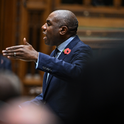YES: Legalisation and regulation of some illicit drugs is now on the agenda; Nick Clegg is leading calls for a royal commission on Britain’s drug laws. This comes ahead of a 2016 United Nations special summit which will consider global alternatives to prohibition. Originally scheduled for 2019, it was brought forward at the request of several member states. Meanwhile, two US states (Washington and Colorado) passed laws at the start of this year to legalise cannabis, and Uruguay has become the first nation to make it legal to grow, sell and consume it.
Criminalising the users, as well as the producers, of drugs such as heroin, cocaine and cannabis has handed global criminal gangs and terrorists a market worth at least $300bn per year, according to the UN Office on Drugs and Crime. The current policy, which is based upon the UN conventions of 1961, 1971 and 1988 and the UK Misuse of Drugs Act of 1971, has destroyed the lives of countless young people, and cost the UK taxpayer £15bn per year.
Legalisation with strong regulatory systems can, I believe, be a much safer option. However, the case for each drug must be addressed separately. The legalisation of heroin supply to addicts, for example, must be limited to a clinic setting where the heroin is injected. This policy, in operation for more than a decade in Switzerland and comprehensively evaluated, has been shown to be successful in curing addiction, dramatically reducing crime and restoring severely sick people to health and employment.
America is already demonstrating a more sophisticated attitude towards drug reform. Prior to the advent of legal cannabis for social use in the two aforementioned states, 20 further states, plus the District of Columbia, had already passed laws legalising it for medical use (often de facto legalisation for social use).
In the UK, young people wanting to smoke a spliff find that the only cannabis available from the dealers is skunk—a highgrade strand which is far more profitable for the dealer to push than the weaker variety. Young people might not want skunk, but when nothing else is on offer too many end up with the strongest and most dangerous variant of the drug. Worse still, a young person looking for a spliff is often told by the dealer, “Sorry, mate, no cannabis but I do have something much more exciting,” a risk of the unregulated and criminalised environment in which these drugs are consumed. The only way forward to a rational drug policy is through a cross-party review and policy agreement.
NO: Drug legalisers make their case in clichés and slogans, free of thought. None of these are true. The global drug trade is financed not by some mysterious Mr Big of crime, but by millions of thoughtless, selfish young people, pouring billions of dollars, pounds and euros into the business.
The fact that it is illegal does not “hand” the trade to criminals. If it were legal, it would be taxed, and criminals would smuggle these things, just as they now smuggle legal alcohol and cigarettes.
Heroin abusers (like other consumers of illegal drugs) are criminal offenders, not patients, whose principal victims are their families and neighbours. If we deterred them with effective punishments, there would not be anything like as many of them.
“Addiction” is a fiction, a concept lacking any objective scientific basis, used to avoid or deny personal responsibility. Mugging the taxpayer to provide abusers with methadone is an immoral failure. It doesn’t work and it turns the state into a drug dealer.
As for cannabis, myriad studies correlate its use (in all forms) with unpredictable mental illness, sometimes severe, especially when used by the school-age children who are increasingly being introduced to it. We have—rightly—never countenanced the tobacco lobby’s attempts to market “safer” cigarettes. Why accept the cannabis lobby’s attempt to pretend that this potent drug can ever be safe in any form or quantity?
De facto cannabis legalisation is already well advanced in most western countries. Claims of harsh legal persecution of cannabis users, often made by legalisers, don’t stand up to examination. Legal laxity, far from “freeing up” police to pursue the supposedly harder drugs, has encouraged feebleness in the enforcement of all drug laws, and weakened the moral case against self-stupefaction.
What then would be the purpose of full, formal, de jure legalisation of such drugs? Could it possibly be that cynical businessmen see future profit, and cynical politicians see a new source of tax?
YES: Hitchens’s views are 50 years out of date. The 1961 UN convention criminalising drugs was based upon a moralistic view of drugs and users. Addiction was little understood. Since then medical research has taught us a great deal. As a result, the UN stated in January 2014: “Drug dependence is considered by science to be a multifactorial chronic disease affecting the brain.” And it has changed its interpretation of the UN conventions, arguing that addiction is a health problem and people with drug dependence should be given treatment and support. Does Hitchens consider alcoholics to be criminal offenders too? There is no psychobiological difference between an addiction to alcohol or heroin.
The logical position on cannabis legalisation is that young people who are going to take cannabis need to be able to buy the safer strands, clearly labelled, from a safe outlet. Unlike Hitchens, I will await the evaluation of such policies in the US and Uruguay.
Despite the clear evidence in support of the need to reform the current drugs laws in Britain (at least to replicate the successful decriminalisation of the use of all kinds of drugs in Portugal) politicians have been reluctant. In 2002, David Cameron as a young MP and a member of the Home Affairs Select Committee, helped compile a report which urged the UK government to initiate an international discussion including the possibility of legalisation and regulation to tackle the global drugs dilemma. As Prime Minister he has not been willing to follow this through.
When the current Home Affairs Select Committee recommended a Royal Commission to review drug policy in December 2012, the Home Secretary quickly dismissed the idea. Labour politicians are equally wary of advocating for reform. Why? The public remains fearful of addiction and is not yet aware that careful and responsible regulation of some drugs could be safer for their children. Journalists with a simple moralistic view of addiction help fuel those fears.
NO: Drugs are illegal because they wreck the lives of those who use them, and of those who love and care for them. No passage of time will ever make this right. Pseudo-science and psychobabble fool only those who wish to be fooled. The concept of “addiction” is a huge, unproven claim about the nature of personal responsibility, mainly used by its adherents to destroy the deterrent power of the law, classifying crime as an illness.
Habitual drinkers are not criminals. They are breaking no law. But there is a strong moral argument against all forms of self-stupefaction, as most of those who have shared a home with a habitual drinker will know.
Why must we assume that “young people” are “going to take cannabis”? Given that the young appear to be at the greatest risk from it, should we not be providing a credible deterrent counterweight to the huge peer-pressure to take drugs which they experience at school? Cannabis (like tobacco) is never safe. It has taken 60 years, and countless horrible deaths, to create effective laws to discourage cigarettes. What sort of irresponsible person would throw away existing legal safeguards against cannabis which will be hugely difficult to restore, even when its mass use turns out to be a public health disaster?
Nobody “needs” to buy this. Making the state a drug dealer does not get rid of the dealer; it makes squalor respectable, and corrupts the state. The claims made for Portugal are probably exaggerated and certainly much disputed. The de-facto 40-year decriminalisation of drugs in Britain is a far larger and more significant experiment, and it is disastrous enough already.
Meacher misses the significance of Cameron’s behaviour in office. “Tough’” rhetoric conceals weak action. As the Times said almost 22 years ago: “the law banning cannabis sale and use is all but unenforced.” Every informed person knows this. Why do the decriminalisers pretend it isn’t so?
YES: It is not good enough to refer to serious research into the causes of drug addiction and the effects of different drug policies as “psychobabble.” It is also not acceptable to suggest that the UN Office on Drugs and Crime has been wilfully “fooled” by the science. It is time that the UK government looked at the evidence of effective drug policies. The Swiss and Portuguese models of legalisation and decriminalisation have been evaluated and found to be both successful and cost effective. These policies should be introduced into the UK.
The legalisation of cannabis needs to happen now. At a time of fragile economic recovery, throughout which the coalition has repeatedly slashed spending on public services, it seems madness to ignore a potential new source of tax revenue. Colorado alone raised over $2m in taxes on recreational marijuana in January, its first month of legalisation, which increases to $3.5m if you include sales for medical purposes. The first $40m is being used to build new schools, while further public health projects, youth prevention programmes and substance abuse treatments are planned. Current estimates from the state governor’s office put potential annual tax revenues at more than $100m.
There is a window of opportunity to bring drug reform into the political mainstream before the 2016 UN summit, a reality that the Deputy Prime Minister appears to grasp. Distancing himself from his coalition partners, he recently declared; “If you are anti-drugs, you should be pro-reform.” I couldn’t agree more. The war on drugs has failed and it is time for a fresh approach.
NO: I would never reject serious, objective science as psychobabble. But scientific claims, not backed by such hard evidence, are far too often used to try to close debates that are of an essentially moral nature.
The ability of people to believe what they wish to believe is an unchanging feature of life. Some people even persist in the view that there is a “war on drugs,” when there is clearly no such thing. Instead we have had decades of de facto decriminalisation, during which the abuse of theoretically illegal drugs has vastly increased.
Those who want to destroy their lives with drugs are appallingly free to do so. Why would any decent person campaign to make this bad situation even worse? Amid Baroness Meacher’s verbal smog, we see a flash of ghastly truth. She actually says: “It seems madness to ignore a potential new source of tax revenue.” Seldom is such cynicism spoken out loud. To whom, exactly, does it seem to be “madness” to protect the young from irreversible mental illness?
This campaign is about money at any cost. The legal changes its supporters now seek would chiefly permit greedy governments to gather taxes from human misery, and greedy businessmen to amass profits from sickness. I am so glad I’m out of date.













